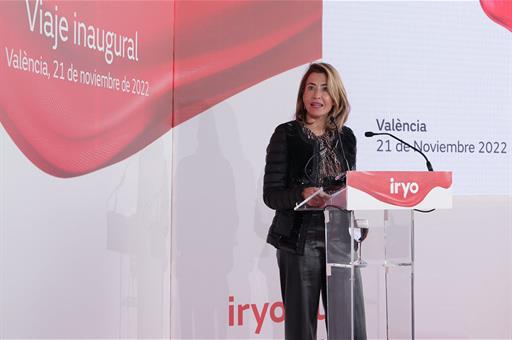Raquel Sánchez praises Spain's railway liberalisation and demands reciprocity from the rest of the European Union
News - 2022.11.21
The Minister for Transport, Mobility and Urban Agenda, Raquel Sánchez, has highlighted the success of the liberalisation of the high-speed railway in Spain, where three operators are already operating, and has demanded reciprocity in the other European Union countries to contribute to the expansion of the market. "We are proud to have established transparent, non-discriminatory conditions for all agents interested in liberalisation, with no favourable treatment", said the Minister at rail company Iryo's commissioning ceremony, held at Joaquín Sorolla station in Valencia.
Thus, after the inaugural journey between Madrid and Valencia, the head of the Ministry for Transport, Mobility and Urban Agenda highlighted that Iryo, together with the French company Ouigo and the Spanish company Renfe, now compete on equal terms in the Spanish railway system, within the recent liberalisation process undertaken by Spain, which has turned it into the first country in the continent with three first-rate companies providing high-speed services.
In this context, Raquel Sánchez called for reciprocity from the rest of the European Union countries when it comes to giving access to third-party operators in order to make liberalisation a global success. "This process requires reciprocity. The competition we favour here should be standard currency throughout the Union. I can only describe the obstacles to rail liberalisation that we are seeing in certain countries as unjustifiable", she said.
According to the Minister, the liberalisation of the high-speed network has meant an unprecedented opening that is making the service accessible to all citizens. "Competition has reduced prices and has made high-speed trains lose their elitist nature, increasing the social profitability of investments and ensuring the right to mobility for all citizens", she added.
For the head of the Department, the ultimate beneficiary of liberalisation is the sector as a whole, "since competition is synonymous with innovation, without undermining quality".
Overall, the liberalisation will mean an increase of around 55% in high-speed services in the Madrid-Barcelona, Madrid-Levante and Madrid-South corridors.
"In the short term, this will be reflected in demand, with an increase in traffic of around 30% compared to 2019", said Raquel Sánchez, who indicated that she expects competition to soon enter other routes, such as Madrid-Galicia, the Mediterranean Corridor or Madrid-León-Asturias. "I am confident that they will attract the same interest from companies as the lines where capacity framework agreements already exist", she asserted.
Sustainable mobility and commitment to rail
"We understand that the only means of transport capable of ensuring sustainability, territorial cohesion and progress in Spain is the rail travel", explained Raquel Sánchez, adding "it is the key to transitioning towards a new development model to face the huge challenge of the climate emergency".
She also stressed that rail liberalisation is not only bringing back passengers lost due to the pandemic, but also adding new ones. This transfer of traditional users to other modes of transport "also has an environmental and economic impact, because eschewing private vehicles and aeroplanes in favour of rail travel is a victory for sustainability", the Minister pointed out.
High-speed railway in Spain
The high-speed network in Spain connects 70% of the Spanish population and will exceed 4,000 kilometres before the end of the year, with the commissioning reaching as far as Murcia. With an investment of over €60 billion, it has contributed to the socio-economic development and territorial structuring of Spain.
Minister Sánchez reported that the Department estimates that between 1992 and 2021, the use of the new high-speed rail network has generated savings of around €6 billion, if its impact on climate change, pollution and accidents is evaluated.
"We are a world power in high-speed travel, but not only in terms of track kilometres, but also in terms of railways and industry. We are also technology leaders in interoperability and in signalling and circulation systems. We are in a privileged position to compete in a market where the major international projects are transport projects linked to infrastructure development," concluded the head of the Ministry for Transport, Mobility and Urban Agenda.
Non official translation





